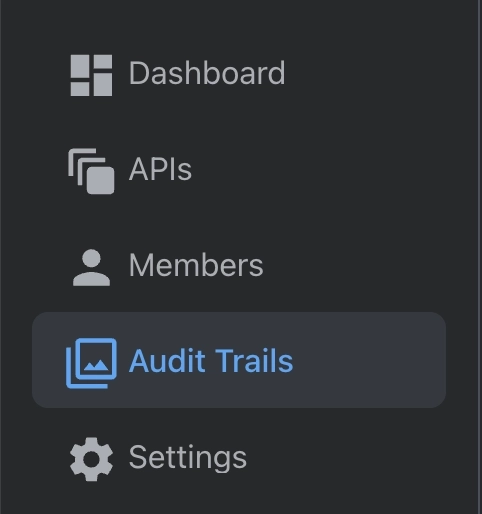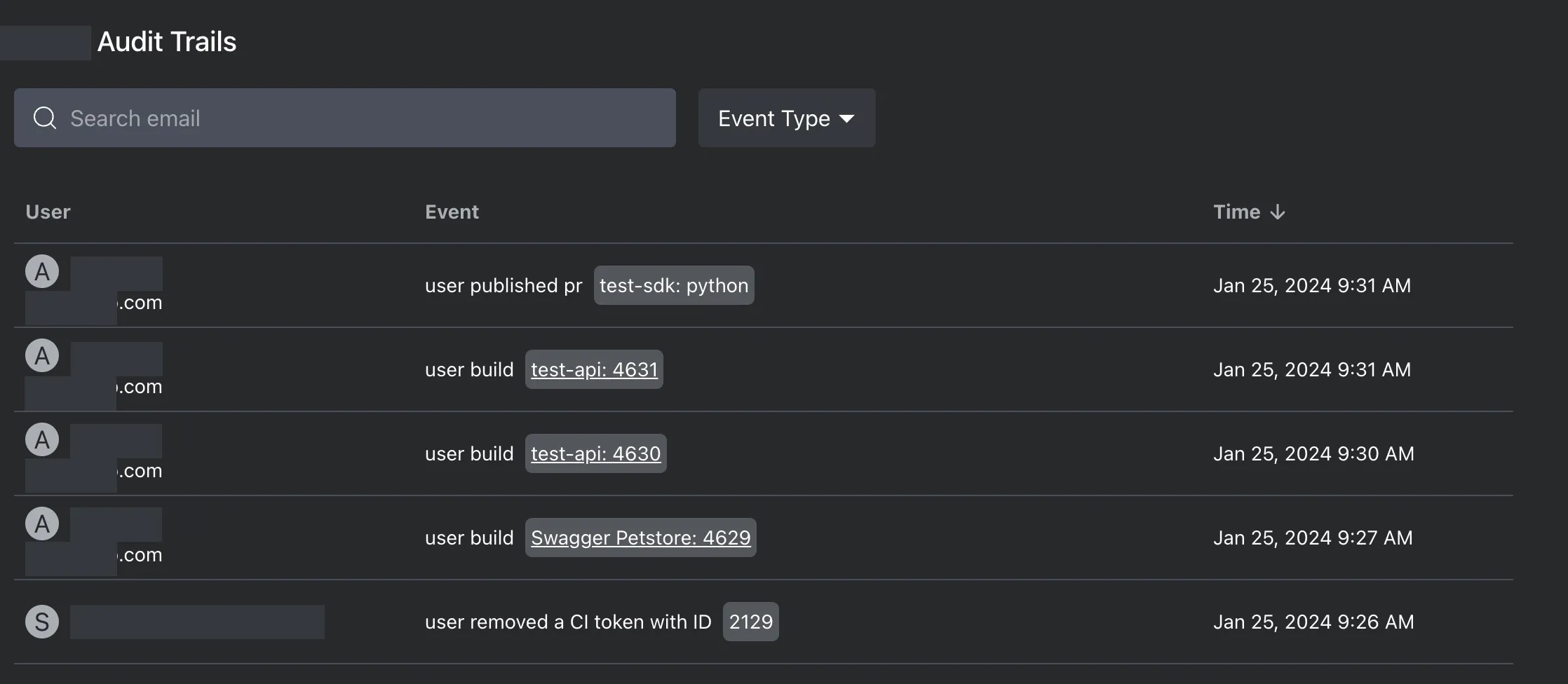One of the exciting new features available in the liblab Portal is the Audit Trails feature!
With the Audit Trails feature, organization admins gain the ability to closely monitor and track a wide range of crucial user member activities. This includes:
- keeping track of SDK builds
- monitoring document approvals
- tracking PR publishing
- and much more!
The Audit Trails feature empowers organization admins with enhanced visibility and control over the platform, ensuring that all important actions are recorded and can be easily reviewed when needed.
What is an Audit trail?
Audit trails, also referred to as audit logs, play a vital role in ensuring data security, regulatory compliance, maintaining accountability, and facilitating incident response.
By keeping a detailed record of all actions and events related to the system, audit trails provide a comprehensive view of the activities performed, helping to identify any potential unauthorized access, monitor compliance with established policies and procedures, and support investigations during security incidents or breaches.
In addition to their primary function of tracking and documenting system activities, audit trails also serve as valuable tools for monitoring and analyzing user behavior, detecting anomalies, identifying trends, and enhancing overall system performance and optimization.
The implementation and effective utilization of audit trails are essential components of a robust and proactive approach to maintaining the integrity, confidentiality, and availability of data, as well as ensuring organizational compliance with relevant regulations and standards.
Types of Audit Trails?
1. Data Security
The Audit Trails feature is an essential component of data security. It plays a critical role in safeguarding sensitive information by maintaining a comprehensive log of user activities.
This log serves multiple purposes, including the detection of any potential unauthorized access attempts. By monitoring user actions, the Audit Trails feature helps ensure compliance with established policies and procedures, guaranteeing the integrity, confidentiality, and availability of data.
With its ability to track and trace user interactions, this feature provides valuable insights into system usage patterns, aiding in the identification of any irregularities or anomalies.
By capturing and documenting actions taken within the system, the Audit Trails feature enhances accountability and transparency, enabling organizations to effectively manage and mitigate potential risks.
2. Compliance
Many industries and organizations across various sectors are required to strictly comply with regulatory requirements that mandate the comprehensive logging and continuous monitoring of specific activities. These regulatory measures play a crucial role in ensuring the accountability and transparency of businesses, as well as safeguarding the interests of stakeholders.
By maintaining detailed audit trails, organizations can effectively demonstrate their compliance to regulations such as SOC 2, which is widely recognized as a benchmark for data security and privacy standards in the industry.
3. Accountability
Audit trails are an essential feature of our system as they attribute and track actions and changes made by specific users or entities. This not only establishes a sense of accountability but also serves as a deterrent against malicious behavior. By maintaining a clear record of who did what, we ensure accountability and transparency and can easily identify any unauthorized actions or suspicious activities within our system.
4. Incident Response
In the event of a security incident, audit trails play a crucial and indispensable role in incident response. They serve as a comprehensive and invaluable source of real-time or historical data that allows security teams to effectively analyze and comprehend the nature and extent of the incident, as well as the nefarious actions executed by attackers.
By having access to these audit trails, security professionals are empowered with the necessary information to make informed decisions and take appropriate countermeasures in order to mitigate the impact of the incident and prevent future occurrences.
How do I access my organization's audit trails?
Audit trails are only available to organization admins. Member users do not have the ability to view them.
To access your organization's audit trails, go to the liblab portal and click on the Audit Trails icon in the left toolbar.

Or navigate your browser to app.liblab.com/audit-trails.
There, you will see a paginated view of your organization's audit trails, sorted by the most recent event. There are a couple of filter options available: search by email and event type.

Some events, such as user build, will include a hyperlink to view more details about the build. This link provides information about the languages that were built and SDK documentation.
What user events are audited?
The following user events are currently being audited by our system. Additional events may be added in the future as we introduce new features and enhancements.
| Event Name | Description |
|---|---|
| User Create | The user create event is audited whenever a new user is created in our system. Its purpose is to maintain a complete and accurate record of all user creations, allowing us to track user growth and analyze trends over time. |
| User Verified Email | The user verified email event is tracked when a user validates their email address. It ensures that the email validation process is properly documented and can be traced if needed. |
| User Create API | The user create api event is recorded when a new API is added to our system during the initial SDK build process. The audit log includes the name and ID of the API record, which can be viewed by organization admins for more details. |
| User Build | The user build event tracks the occurrence of a build performed by our CLI. The corresponding audit entry contains the API name linked to the build and a unique build ID. Organization admins can access the build details, including the programming language SDKs included in the build, and approve or unapprove any associated documents. |
| User Approved doc | Whenever a user approves a document, the the user approved doc event is tracked.. The audit entry displays the ID of the approved document, and organization admins can preview the API documentation by clicking on the document ID. |
| User Unapproved doc | Likewise, when a user unapproves a document, the user unapproved doc event is tracked. The audit entry displays the ID of the unapproved document, and organization admins can preview the API documentation by clicking on the document ID. |
| User Published PR | When a user publishes a pull request (PR) from the CLI for a specific programming language SDK, the publish PR event is tracked. The audit entry includes the name of the SDK and the associated programming language. |
| User Publish PR Failure | Similarly, if a pull request fails to publish, the user publish pr failure event is tracked. The audit entry includes the name of the SDK and the associated programming language. |
| User Invite Member | The user invite member event is tracked whenever a user invites someone via email to join their organization. Users can invite new members through the liblab Portal, and the audit entry includes the email address of the invited individual. |
| User Add CI Token | When a user adds a Continuous Integration (CI) token through the Command Line Interface (CLI), the user add CI token event is tracked. The audit entry includes the token name, and the ID associated with the generated token. |
| User Remove CI Token | Similarly, when a user removes a Continuous Integration (CI) token through the CLI, the user remove CI token event is tracked. The audit entry only includes the ID associated with the removed token. |
Future Enhancements
We are continuously working on enhancing our Audit Trail functionality to provide you with a seamless experience. As part of our ongoing efforts, we are exploring additional features that will further improve the functionality of our Audit Trails.
One of the features we are considering is the ability to search audits by date range. This will allow you to easily locate specific audits within a specified time frame, making it more convenient for you to track and review relevant activities.
In addition, we are exploring an export feature that will enable you to export your audit trails to a file. This will provide you with the flexibility to save and analyze your audit data offline or share it with other stakeholders as needed.
We value your feedback and want to ensure that the Audit Trail process meets your needs and requirements. If you have any frustrations or suggestions regarding your current audit trail process, we would love to hear from you. Your input is invaluable in helping us shape the future of our Audit Trails functionality.
Please feel free to contact us! and share your thoughts, suggestions, or any challenges you may be facing. We are here to assist you and make your audit trail experience as seamless and efficient as possible.
Thank you for your continued support and partnership.
